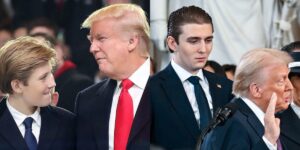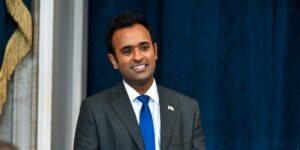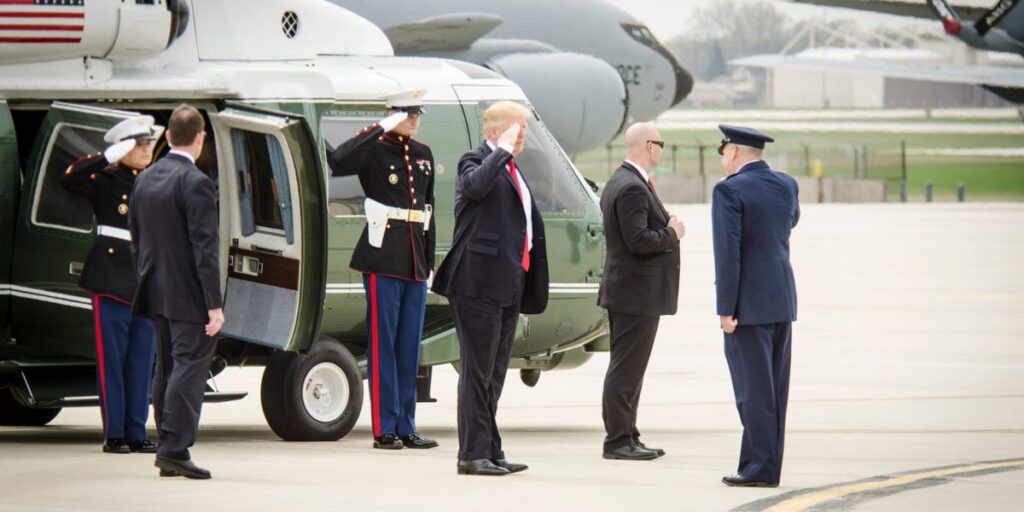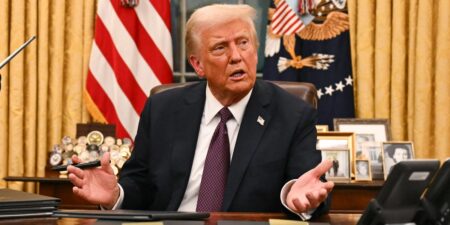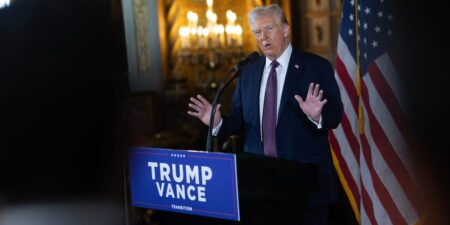- President Trump spoke about his plans for the US military on his first day back in office.
- He promised to reinstate and give back pay to service members dismissed for refusing COVID-19 vaccines.
- He also wants to use the military in mass deportation operations and has referenced culture war issues.
President Donald Trump outlined several key US military policies on his first day back in office.
Many of his pledges, such as reinstating service members who were dismissed for refusing the COVID-19 vaccine and engaging in controversial culture war issues in the Pentagon, tie into the Commander-in-Chief’s goal of a major US Armed Forces overhaul.
Trump was officially sworn into office on Monday and began signing a flurry of executive orders, including reversing former president Joe Biden’s policies on oil and gas drilling in Alaska, keeping TikTok open while it finds a potential buyer, and declaring emergencies on national energy and immigration at the US-Mexico border.
He also signed an executive order declaring Mexican cartels to be foreign terrorist organizations and suggested he could send US Special Forces to Mexico to take them out. “Could happen,” he said. “Stranger things have happened.”
During his inauguration speech, Trump presented attendees, including former presidents Joe Biden, Barack Obama, George W. Bush, and Bill Clinton, with his vision of the US military.
“America will soon be greater, stronger, and far more exceptional than ever before,” he said. “We will measure our success not only by the battles we win, but also by the wars that we end, and perhaps most importantly, the wars we never get into,” Trump said.
The statement echoes comments the President made on the campaign trail and after the election, as well as those made by his Secretary of Defense nominee Pete Hegseth, who vowed to restore the military’s “warrior ethos,” readiness, and lethality during his confirmation hearing last week.
Here’s everything Trump said about the US military during his first day back in office — and what to expect next.
Trump promised to reinstate service members who refused the COVID-19 vaccine — with back pay
The President said he’d reinstate the more than 8,000 troops dismissed from military service for refusing to take the COVID-19 vaccine.
The mandate was originally issued in August 2021 by then-Defense Secretary Lloyd Austin and lasted until January 2023, with limited exceptions for medical or religious reasons. It was repealed when Biden signed a defense spending bill in December 2022.
Congressional Republicans have previously argued the rule hurt the US military’s readiness amid a recruitment crisis. Pentagon officials have denied this and said only a small number of dismissed personnel reapplied for military service after the mandate was lifted. Around 99% of the active-duty Navy, Marine Corps, and Air Force had been vaccinated, as well as 98% of the Army.
In his inauguration speech, Trump also promised full back pay to the reinstated service members. Hegseth also suggested this last week.
Trump plans to use the military in his crackdown on illegal immigration
On Monday night, Trump signed an executive order declaring a national emergency at the US-Mexico border, as well as an executive order to send US Northern Command to “seal the borders and maintain the sovereignty, territorial integrity, and security of the United States by repelling forms of invasion including unlawful mass migration, narcotics trafficking, human smuggling and trafficking, and other criminal activities.”
Throughout his campaign, Trump heavily focused on illegal immigration and indicated plans to launch a mass deportation campaign. After the election, he suggested he could use the US military to do so.
Legal experts have said using the military to control immigration and deportation is complicated due to different rules governing military forces, state defense forces, and civilian law enforcement, Cassandra Burke Robertson, a professor of law at Case Western Reserve University, and Irina D. Manta, a professor of law at Hofstra University, wrote in The Conversation on Monday.
Deploying National Guard units to the southern border has precedent — Trump did it himself in April 2018, as did Obama and Bush — but the military is generally forbidden from enforcing domestic laws. Trump could use the military in a support role, though.
Trump said he’d end “radical political theories” and other culture war issues in the military
During his inauguration speech, Trump said he’d sign an executive order “to stop our warriors from being subjected to radical political theories and social experiments while on duty,” referencing his larger ideological fight.
Trump and the Republican Party made so-called “woke” policies, including diversity, equity, and inclusion, top platform issues, arguing they hurt military readiness. Hegseth has made varied statements on this issue, many of which — such as his flip-flopping comments against women serving in the military — were the center point of his confirmation hearing.
It remains unclear which of these issues will become concrete policies and how the President will implement them, although they align with other plans to cut spending in the Pentagon, gut top ranks, and roll back federal DEI efforts.
On Monday, Trump signed an executive order revoking Biden’s policy allowing transgender people to serve in the military, clearing the way for a ban on trans service members similar to the ban in his first term.
Read the full article here


